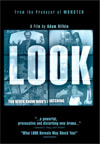Look
Anchor Bay Entertainment
Cast: Hayes MacArthur, Jamie McShane
Extras: Commentary Track, Featurettes, Deleted Scenes, Trailer, TV Spot
Rating:
Almost every human being living in modern society has felt the need to tread cautiously at one point or another in fear of the quite-possible reality they're being watched. Rod Serling and George Orwell were masters of manipulation in their times which their audiences were made to feel claustrophobic about having their lives scrutinized through public display.
In the tech-driven world we live in, surveillance cameras carry twice the fear factor as alluded to by Serling and Orwell. It's to the point cameras potentially catch us doing anything from picking noses to cheating on tests to fingerpointing oddball ways of self-gratification. Adam Rifkin's "Look" is told from both a paranoiac's viewpoint as well as a voyeur's. In a reality-television-addicted world, "Look" proposes to spark the ultimate geek show for no-lifers while ultimately making a ubiquitous sociodrama about where civilization has harmfully run amidst its confused and conflicted course.
Topics such as sex, murder, thievery, nuances of hetero and homosexual relationships, kidnapping and seduction of adult men by underaged nymphs are explored in "Look," a film that hypothesizes what the world looks like through the indiscriminate electric eye.
Granted, do not be fooled into thinking "Look" is pieced together using genuinely live and unhampered camera footage. Yes, stocks of the film are shot through actual surveillance cameras to give it that feel of near-authenticity, but "Look" instead is more of a forced drama using this unorthodox method of filming. The fact Rifkin's subjects eventually cross paths with each other at one point or another in "Look" tells you this is straight-up scripted.
On the other hand, what Rifkin presents is compelling enough to withhold you the entire ride, even from the get-go as a pair of teenaged girls drift into a department store fitting room, strip down, act expectedly outrageous before the blonde chick walks off with the top she brought inside still on her person as she and her bamboozled friend make a bare escape. Along the way, another camera "catches" the pair as they ram into another parked car before zipping off irresponsibly, laughing all the way.
Rifkin weaves a series of intertwining vignettes shot through purported hidden cameras such as those located on ATM's, intersections, back rooms, hotels, mall corridors and white collar offices. Though it's hard to buy into the concept we're seeing real-time captured events, "Look" is nevertheless intriguing, mildly shocking and frequently hilarious.
Particularly unnerving (especially if you're a parent) is to watch scenes of a child stalker in the mall who constantly creeps into the lenses of various cameras, is thwarted many times through circumstance until the child's mother makes a foolish mistake and leaves her daughter unattended in the wide open of the food court. Despite many potential witnesses, the lure and theft of the child goes down unhinged and as you watch "Look," the identity of the kidnapper will haunt you.
On the flipside, a hilarious "Who farted?" sequence unravels in an elevator in which the film's office dweeb gets blamed for someone else's flatulence. Also ridiculous is the horndog department store manager who is boinking most of the female staff (married and non) in the stock room. His unbelievable ass-grabbing behind the registers is enough to make you roar in laughter, even more so when he finally meets his match with an unwilling new girl who threatens him with sexual harassment.
"Look" cuts right to the nerve with its intentions, as a woman kidnapped at an ATM is left for dead in her trunk while the movie continuously rolls back to a camera showing her abandoned car in the mall parking lot in passed day increments. The criminals responsible for this atrocity have at this point already killed a police officer on the road (the murder is of course captured on the cop's vehicle camera) and routinely stop at a convenience store which becomes the focus of another microcosmic set of characters and dramas unto itself.
The most destabilizing thread of "Look" occurs from the manipulations by one of the teenagers from the opening sequence who has a crush on her writing teacher. She stalks him down relentlessly through the film to the point he caves in and has sex with her in the school parking lot. In a dicey game of he-said-she-said, the girl accuses him of rape while he defends he was seduced. The surveillance camera in the school parking lot reveals her lie yet statutory rape is still statutory rape. Interestingly enough, the teacher's appointed lawyer happens to be a married man having a gay fling on the side and he also happens to be the father of the kidnapped girl. The reaction of the girl's father to her cock-and-bull story is perhaps the most visceral moment of the entire film.
The you-are-there concept of "Look" is novel, most certainly. It's raw and bare-knuckled in spirit, and though the principals are actors, Rifkin conducts his scheme like a well-orchestrated shock vehicle. Though the stories are fabricated, they undeniably reflect our disturbed society with frightening honesty. You won't forget this film, embossed engines or not.







